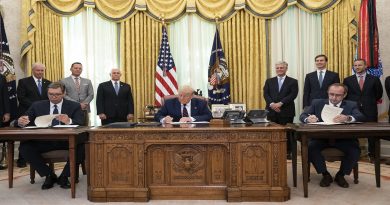U.S. Open to New Approach to North Korea
Santiago Losada
Staff Writer
During a moment of increasing tensions in Asia, United States Secretary of State Rex Tillerson made his first major foreign visit to the region. On March 16, while in Tokyo, Tillerson announced that there needed to be a different approach to handle North Korea’s increasing nuclear threat, as reported by the Los Angeles Times.
During the past 20 years, the United States has provided $1.35 billion to North Korea to encourage it to abandon its nuclear program. The New York Times reports that Mr. Tillerson will highlight this issue in Seoul, South Korea and Beijing, China, the next stops of his trip to Asia.
North Korea has been the most pressing issue for the United States and its allies in Asia recently because of its frequent launching of ballistic missiles and because it is close to testing a missile that could reach the United States, The New York Times added.
Officials in the U.S. administration have said that all options are on the table, although Tillerson hinted that Washington’s response would be to continue the full implementation of United Nations sanctions and would press China to use its leverage over the regime of North Korea.
President Trump stated that he would consider inviting Kim Jong-un, the North Korean leader, to Washington, but the idea of direct negotiations is very unlikely unless North Korea agrees to give up its nuclear weapons program.
The Guardian stated that Trump’s demand for China is to do more to control North Korea. Tillerson has also said that “we will be having discussions with China as to other actions that they should be undertaking.”
Although China has supported U.N. resolutions condemning North Korea’s nuclear and missile tests, it is unlikely that Beijing will support any measure that will lead to the fall of the North Korean regime.
If North Korea became a failed state, that could lead to a huge increase in refugees and the presence of U.S. and South Korean troops on the North Korean border. China has also been reluctant to help because of the deployment of a controversial U.S. anti-missile system in South Korea.
According to ABC News, a North Korean diplomat said on Thursday that North Korea needs to act in self-defense against U.S.- South Korea military drills. While Washington claims the maneuvers are routine and defensive, North Korea views the drills as a way to use nuclear weapons for a pre-emptive strike.
Tillerson has also stressed the critical importance of the cooperation between Japan and South Korea. While in Tokyo, both Tillerson and Japanese Foreign Minister Fumio Kishida reiterated that the U.S.-Japan mutual defense treaty also covers the Japanese-administered islands in the South China Sea that are also being claimed by China.
Since both Japan and South Korea host thousands of U.S. troops, Washington has been urging its allies to increase security cooperation despite their historically strained relations. Although cooperation between the two is necessary, the Japan-South Korea relationship has been hindered over the failure to implement an agreement in 2015 in which the Japanese government would compensate South Korean victims of sexual slavery inflicted by the Japanese military during World War II.
Although there will be a new approach to dealing with North Korea, details of that plan are not known. Nikki Haley, the U.S. Ambassador to the United Nations, has rejected China’s suggestion of the U.S. and South Korea suspending military drills if North Korea suspends its missile testing.
NPR reports that all options are on the table to deal with North Korea. Haley believes that North Korea is an irrational actor that does not listen to reason. After a Security Council meeting on March 8, the ambassador reiterated how the recent actions of North Korea should not be taken lightly.
The United States Mission to the United Nations reports that the global community needs to understand that every country is in danger from the actions of North Korea. Haley also told the Security Council that the U.S. would reevaluate how it will handle North Korea going forward.


